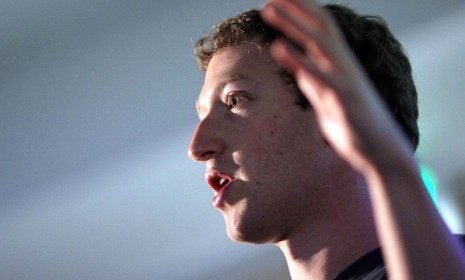Facebook's Open Compute Project: What does it mean?
The social-networking giant designs a greener and cheaper server... and it's offering to share the technology with rivals. Why?

A free daily email with the biggest news stories of the day – and the best features from TheWeek.com
You are now subscribed
Your newsletter sign-up was successful
OK, so most people think computer servers are anything but "sexy." Facebook is trying to change that. On Thursday, the social-networking giant announced that it had built a groundbreaking new kind of server at its data center in Prineville, Ore., that's 38 percent more energy-efficient and 24 percent more cost-effective than previous machines — a big deal for tech companies with electric bills running into the millions. And, in a move that's being called "highly unusual," Facebook said it would publish the tech specs for the servers so that other companies can use and improve upon their design. The open source project is called the Open Computer Project, and it has set the tech world abuzz. What might it mean? Here, four takes:
1. Facebook is flexing its rapidly developing muscles
The internet behemoth continues to drive home the fact that its "start-up days are long behind it," says Sharon Gaudin at Computer World. Sure, "it's not news that Facebook, with more than 500 million users, is a major player in the online industry." But Thursday's announcement made it "startlingly clear just how important the company has become." Yes, says analyst Richard Fichera. "It's an indicator of their change in status... like a coming-out party... Not everybody is big enough to merit designing your own data center."
The Week
Escape your echo chamber. Get the facts behind the news, plus analysis from multiple perspectives.

Sign up for The Week's Free Newsletters
From our morning news briefing to a weekly Good News Newsletter, get the best of The Week delivered directly to your inbox.
From our morning news briefing to a weekly Good News Newsletter, get the best of The Week delivered directly to your inbox.
2. It's gearing up to challenge Google
"Facebook's new cheap, fast, green data center is really a free blueprint for companies that want to chip away at Google's computing advantage," says Dan Mitchell in Fortune. Mark Zuckerberg and Co. have already partnered with Intel and its rival AMD, and it will be interesting to see whether other big companies, like Apple and Amazon, will make use of this technology for their own data centers. One thing is for sure: This was definitely "heard up the road at Google's Mountain View headquarters, which jealously guards its technology" rather than offering to share it.
3. And they're starting a green tech race
Facebook has made a giant leap in the world of energy-efficient data centers, says Charles Babcock at InformationWeek. "The result may be an ongoing arms race among the biggest companies on the web — Facebook, Google, Amazon.com — to build not only the biggest but also the most efficient data centers on earth."
A free daily email with the biggest news stories of the day – and the best features from TheWeek.com
4. Facebook is also gathering allies
Sharing technology and hardware schematics like this is the tech-world equivalent of "breaking bread," says Mark Millan at CNN. According to Facebook's director of hardware, Frank Frankovsky, the company is already working with 10 to 15 partners on this initiative, and has companies like Dell using its hardware.
-
 Film reviews: ‘Send Help’ and ‘Private Life’
Film reviews: ‘Send Help’ and ‘Private Life’Feature An office doormat is stranded alone with her awful boss and a frazzled therapist turns amateur murder investigator
-
 Movies to watch in February
Movies to watch in Februarythe week recommends Time travelers, multiverse hoppers and an Iraqi parable highlight this month’s offerings during the depths of winter
-
 ICE’s facial scanning is the tip of the surveillance iceberg
ICE’s facial scanning is the tip of the surveillance icebergIN THE SPOTLIGHT Federal troops are increasingly turning to high-tech tracking tools that push the boundaries of personal privacy